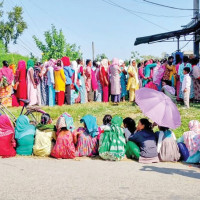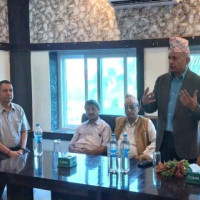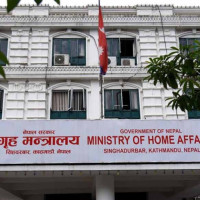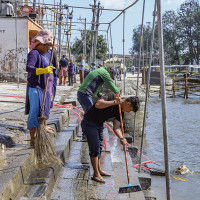- Sunday, 26 October 2025
Leaders recount achievements and challenges of statute implementation
By Pallav Bhusal,Kathmandu, Sept. 19: As Nepal is celebrating the Constitution Day on Thursday, the political leaders are taking the opportunity to reflect on the significant achievements and ongoing challenges of the constitutional framework. This year, their discussions have revolved around the need for amendment to the constitution and the effective implementation of laws and the importance of preserving the core values of inclusivity and democracy embedded within the constitution.
Mahesh Kumar Bartaula, Chief Whip of the CPN-UML, offered his congratulations to all Nepali citizens on this important occasion. “We have crafted an outstanding constitution that serves as a national charter and political document,” said Bartaula. He emphasised the constitution’s role in fostering proportional inclusiveness, social justice, secularism, and democracy, noting its success in addressing various political hurdles.
However, Bartaula admitted certain weaknesses in the implementation of the constitution.
“We have lagged in implementing numerous laws provisioned by the constitution, with 151 bills still pending at the federal parliament. This is our weakness,” said Bartaula.
He informed that there is a provision for a thorough review of constitutional bodies every 10 years, insisting that the constitution is not immutable. “It should evolve to improve its weaker aspects while strengthening the positive ones. Any amendments to the constitution, if deemed necessary, will aim to enhance its effectiveness rather than diminish our achievements. The goal is to strengthen the framework we have established,” he added.
On July 1, the Nepali Congress formed a coalition with the CPN-UML, based on a seven-point agreement reached between the two large political parties and one of the points is related to constitution amendment.
The point stated, “The national consensus government will prioritise reviewing the strengths, weaknesses, and complexities observed in the course of implementing the constitution, and will focus on amending the constitution and enacting related laws in order to ensure political stability.”
Shyam Kumar Ghimire, Chief Whip of the Nepali Congress, hailed the constitution as a monumental achievement that has fostered an inclusive and democratic Nepal.
“The constitutional document itself allows for reviews every 10 years, making this a natural and necessary process,” he said.
Ghimire expressed pride in the inclusive federal system established by the constitution but acknowledged ongoing challenges in implementing various laws and bills. “While we are determined to streamline these processes, this does not mean the constitution requires a total overhaul,” he said.
Ghimire emphasised that the constitution serves as a political document and a national charter designed to enhance governance and ensure a well-functioning system. However, he noted that it does not play a vital role in uplifting the economy.
“The constitution is crucial for regulating the rules and systems that underpin our governance. But the primary focus for the country today should be economic development,” said Ghimire.
The main opposition party, the Maoist Centre, acknowledges both the achievements and the shortcomings in the implementation of the constitution.
However, the party has expressed concerns that the ruling parties may attempt to completely dismantle the established systems during the amendment process.
Rupa Sosi (Chaudhary), Whip of the CPN (Maoist Centre), offered a vital perspective on constitutional achievements, particularly regarding the federal structure that decentralises rights to the people.
“The most significant success of the constitution has been its focus on inclusiveness and secularism,” she said, adding that local governments have gained crucial rights. However, Chaudhary shared her concerns about the slow pace of law implementation.
“The shortcoming in implementation of laws has led to disappointment among citizens and a belief that federalism may not be beneficial.”
She cautioned against potential amendments that could undermine these principles. “There is speculation that changes might threaten our achievements in inclusiveness and secularism as well as abolition of federal structure. However, this remains to be seen. We must ensure that we strengthen, rather than dismantle, these structures.”
Moving forward, the path lies in fostering collaboration among all political parties to ensure that the constitution remains a dynamic document, responsive to the needs and aspirations of all Nepali citizens.
















